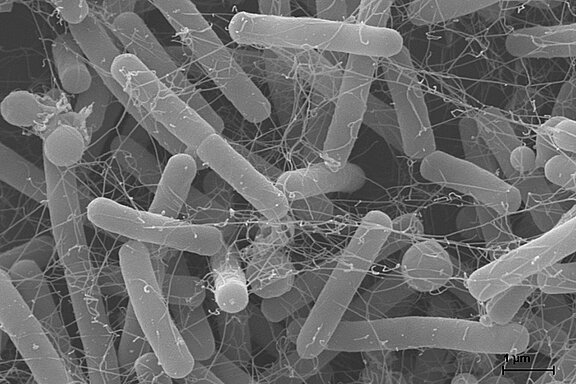A joint One Health study led by the Helmholtz Centre for Infection Research and the Friedrich-Loeffler-Institut investigated the potential efficacy of the natural product chlorotonil A against infection with the bacterium Clostridioides difficile.
This pathogen is transmitted via contact infections and can cause severe diarrheal disease in humans and animals. Particularly dangerous is the emergence of permament stage, i.e. spores of C. difficile that remain in the intestine and can cause a new infection, e.g. after disruption of the natural microbiota by taking antibiotics.
In this joint study, the researchers found that two variants of chlorotonil A – a natural product class of chlorotonils produced by a myxobacterium - worked against C. difficile infection equally well as the antibiotic vancomycin. Further, it was shown to be effective against persistent stages of Clostridioides difficile.
A second focus of the study was to test the effect of chlorotonil A on the gut microbiome. In this part of the study, the research team from the Institute of Molecular Pathogenesis at FLI was able to demonstrate that chlorotonil A causes significantly less damage to the pig microbiome than other antibiotics.
The killing of spores while preserving the protective microbiota could make the two chlorotonils a milestone in the treatment of C. difficile infections.
The study was realized in cooperation with the Helmholtz Institute for Pharmaceutical Research Saarland, the University of Greifswald and the Leibniz Institute DSMZ.
Study:
Bublitz, A., Brauer, M., Wagner, S., Hofer, W., Müsken, M., Deschner, F., Lesker, T. R., Neumann-Schaal, M., Paul, L.-S., Nübel, U., Bartel, J., Kany, A. M., Zühlke, D., Bernecker, S., Jansen, R., Sievers, S., Riedel, K., Herrmann, J., Müller, R., Fuchs, T. M., Strowig, T. (2023). The natural product chlorotonil A preserves colonization resistance and prevents relapsing Clostridioides difficile infection. Cell Host & Microbe, in Press. DOI: 10.1016/j.chom.2023.04.003


